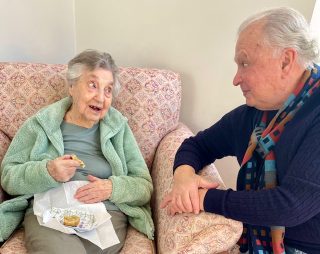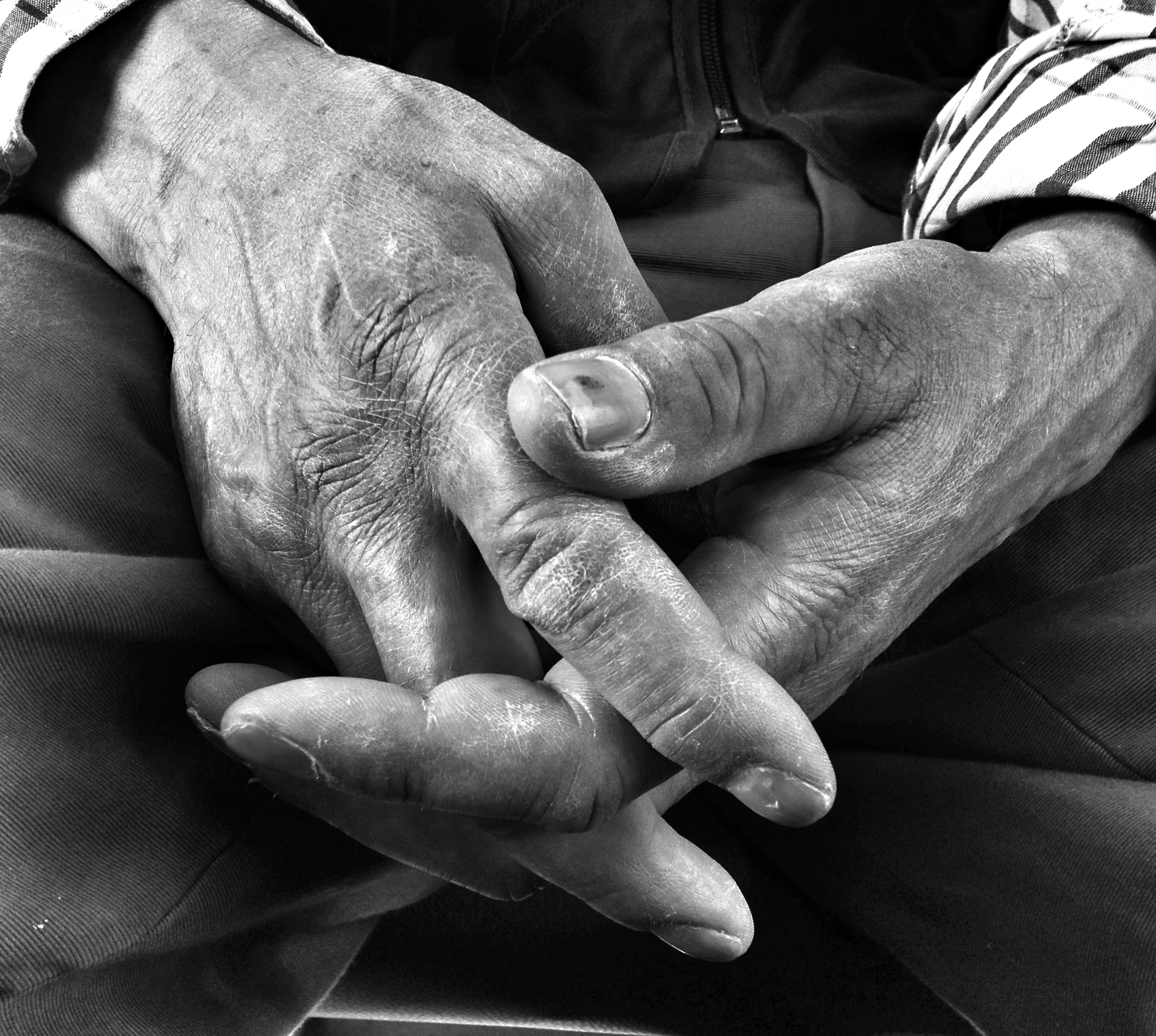“HAPPY BIRTHDAY TO YOU,
HAPPY BIRTHDAY TO YOU,
HAPPY BIRTHDAY DEAR GRANDPA,
HAPPY BIRTHDAY TO YOU.”
Colourful ribbons, streamers and floating helium balloons filled the Jackson House.
Oliver had 10 balloons last birthday. Grandpa Stan had one very large cake, reading ‘Congratulations on your 90th.
“Why can’t Grandpa have 90 candles?”
“The cake won’t hold that many,” said Mum. “The chocolate is too sticky.”
“And I haven’t got enough puff,” smiled Grandpa.
“Nine candles. Each one representing 10 years,” Oliver nodded.
“What will you do next year for your 91st birthday?”
“Not sure,” said Grandpa. “l can’t even remember how many I had last year.”
Since my grandmother had died, he had begun to forget more.
“Oliver got a bike for his 10th birthday,” Mum explained.
“He’s keen on wheels,” she said, as Grandpa nodded.
“I used to ride a bike when I was younger, but I can’t remember how old I was back then,” Grandpa mused.
Mum brought out an old-fashioned black and white photo.
“Grandpa, this was you at Oliver’s age. Both of you had similar hair.”
“Really?” Grandpa laughed and his wrinkled hand touched his bald head.
Oliver smiled too. But then Grandpa’s attention faded.
Oliver stared at his grandfather’s weathered, skinny, wrinkled hands. The blue veins, carrying blood to his frail body, were bulging. His hands were folded in his lap.
Mum was cutting up the birthday cake. She then handed it around to the family. Grandpa ate a little bit, then pushed it aside.
He didn’t seem to be able to concentrate on anything for long. Oliver wondered if one day, when he was old, he would be the same.
“Grandpa, can I visit you next week? To have a talk with you?” he questioned.
“Why do you want to see your grandfather alone?” asked Mum.
“I’m doing a school project about old people,” said Oliver.
“Okay, how about next week? I’ll write a note for the staff at the home so they can remind him to expect you to visit,” Mum confirmed.
“Visit me?” Grandfather asked. “l never have visitors.”
Mum looked sad. “l visit you twice a week, but you don’t remember.”
“I’ll catch the tram to see you, Grandpa. It’s too dangerous for me to ride my bike on the road,” said Oliver.
Grandpa didn’t see too much of his grandkids. They found it hard to talk with him when his mind drifted off, or he told the same stories over and over again.
He spent many hours sitting in his leather recliner chair, with its padded arms, and a blanket over his knees. With his mouth wide open, he would spend the day dozing to pass the time away.
The following Tuesday after school, Oliver kept his promise.
He caught the Number 78 tram along Chapel Street, carrying his list of project questions and a gift to go on Grandpa’s wheelchair.
COVID-19 was still around, and old people were more likely to catch it, so Oliver had to do a test to be allowed to go into Grandpa’s care home. Their health rules were very strict.
“Do you know where your grandfather is?” the receptionist asked Oliver.
“Yes, thank you. Room 13, I’ve been here before with my parents,” he replied.
Oliver noticed that many of the elderly residents were just sitting around, as if they were waiting for something to happen.
A few were dunking their biscuits in their tea, others were sitting in bright, airy, clean rooms, waiting for their dinner to be served.
“Hello, Grandpa. How are you?”
“Much better having seen you, Oliver,” said Grandpa Stan with a grin.
“I’ve brought you something,” the boy said.
“A gift? Just being my visitor is a gift,” the old man said.
Grandpa had been showered and dressed, but not shaven. Grey hairs protruded from his old, weathered, wrinkled face.
“Would you like one of these chocolates, Oliver?”
“Yes please, Grandpa. That would be awesome.”
Oliver sat down, and once again noticed his grandfather was sitting with his wrinkled hands folded in front of him.
“Grandpa, why are your hands so wrinkled?” Oliver asked curiously. “What sort of work did you do when you were young?”
“My hands used to be as smooth as yours, but I had to leave school at 13 to get a job. My family needed money to survive.”
“What sort of work did you do, Grandpa?”
“Shovelling coal in an underground coal mine. I was paid two pounds, six shillings per week, which is around six dollars in today’s money.”
“WHAT?” Oliver couldn’t believe it. “For the whole week?”
“Yes, for the whole week,” said Grandpa. “My hands were blistered badly, and often became infected.”
More stories followed.
“When I turned 18, l joined the Air Force and became a fighter pilot.”
“Did you fight in World War One?” Oliver questioned.
“No, l was only a young boy then. I was one of few Australian pilots, along with the British, to fight during the 1956 Suez Canal conflict.”
“Did you ever kill anyone?” Oliver gasped.
“Yes, Oliver, I did. Let me tell you, it’s the most gut-wrenching thing that these hands of mine ever did,” he said solemnly.
“To know your hand has pulled a trigger and killed someone gives you nightmares for years after. If I hadn’t allowed my hands to do that though, I wouldn’t be here telling you about it.”
Tears flowed out of Grandpa’s eyes, running down the crevasses of his weathered face as he recalled those moments.
After an hour, Oliver spoke during a pause in conversation.
“Grandpa, I’ve got to go soon. Would you like me to come back next week?”
“That would be wonderful, Oliver. I look forward to it,” Grandpa replied.
“Oh, I forgot to give you my gift… it’s a number plate for your wheelchair!” Oliver said.
“I’ll fix it on before I go. I’ve got one on my bike, too.”
At home that night, Oliver spoke to his dad.
“I saw Grandpa today and found out a lot of things I didn’t know. Can I go back and visit again?
“Absolutely, Oliver,” said Dad. “Your grandfather needs company to keep his mind going.”
A week later, Oliver took his school project on the tram ride back to Grandpa’s place.
“I’m writing a story about old people. Can you look at the questions and let me know what you think, Grandpa?”
“Sure thing, Oliver. I’d love to read what you’ve written. You mightn’t know this, but I wrote two books,” he chuckled.
“Can’t remember their names, but one was about my life in the Air Force, and the other about my great grandfather, a general in the Australian Army.
“Are you for real?” Oliver gasped. “Grandpa, that’s just fantastic!”
“After the Suez War, I became a carpenter. With these hands I built my own home, hammering thousands of nails into freshly sawn timber,” Grandpa said.
“See my fingers? They’re scarred due to building accidents. With these hands, I forged a life for your grandmother and our children: your father, Bill, Uncle Charlie and your Auntie Stella,” he went on.
“They held your Grandma Elizabeth’s hands as we walked up the aisle when we got married. These hands held your father William as a baby, and Elizabeth, the love of my life, before she passed away. My hands were old and wrinkled, but when I held hers, they felt tender, soft, and as smooth as silk.”
Oliver liked hearing Grandpa’s stories, even when he repeated bits, or mixed up names.
Later, when Oliver was riding his bike with his brother and sister, he told them about their grandfather’s wrinkled hands.
“Grandpa has done so much with his life. When I grow up, I want to do something important with my hands,” he explained to his siblings.
“Not all old people are boring, you just have to ask them the right questions and listen.”
Late that night, Oliver’s father gently woke him up.
“l have some bad news, mate. Grandpa has just been taken to hospital. He got up during the night and had a fall,” Dad explained.
“How is he?” the young boy asked, tears threatening to spill onto his cheeks.
“Not good, Oliver, I’m sorry. I don’t think Grandpa will be coming home from hospital,” said Dad as he wiped at his red eyes.
“I do know for sure though, that he loved having you visit him, Oliver. He told me every time I saw him.”
Oliver’s amazing grandfather Stan passed away peacefully in the early hours of that morning at 95 years old.
Many years later, Oliver would occasionally look at his hands and smile. As an adult, he now used them to help people as a skilled surgeon at a hospital near his home.
Oliver reflected fondly on their memories over the years. Now hanging off his new bike was Grandpa’s wheelchair numberplate, below his own.
As Oliver would pedal to and from work shifts, gripping the handlebars of his bike and listening to the clack of the two numberplates, he would often wonder if his grandpa would be proud of him.
About the author:
George and his wife, Aileen Hall, regularly visit Aileen’s mother Norma Molloy. George was inspired to write ‘These Wrinkled Hands’ after seeing the Trescowthick Centre’s ‘These Hands’ project in 2021.

Photo: Norma and son-in-law George.










